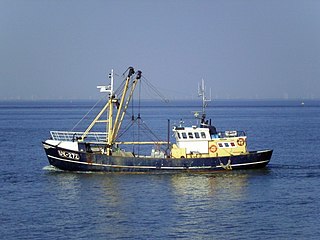
The European Court of Justice (ECJ), formally just the Court of Justice, is the supreme court of the European Union in matters of European Union law. As a part of the Court of Justice of the European Union, it is tasked with interpreting EU law and ensuring its uniform application across all EU member states under Article 263 of the Treaty of the Functioning of the European Union (TFEU).

R v Secretary of State for Transport was a judicial review case taken against the United Kingdom government by a company of Spanish fishermen who claimed that the United Kingdom had breached European Union law by requiring ships to have a majority of British owners if they were to be registered in the UK. The case produced a number of significant judgements on British constitutional law, and was the first time that courts held that they had power to restrain the application of an Act of Parliament pending trial and ultimately to disapply that Act when it was found to be contrary to EU law.

European Union citizenship is afforded to all nationals of member states of the European Union (EU). It was formally created with the adoption of the 1992 Maastricht Treaty, at the same time as the creation of the EU. EU citizenship is additional to, as it does not replace, national citizenship. It affords EU citizens with rights, freedoms and legal protections available under EU law.

The European single market, also known as the European internal market or the European common market, is the single market comprising mainly the 27 member states of the European Union (EU). With certain exceptions, it also comprises Iceland, Liechtenstein, Norway, and Switzerland. The single market seeks to guarantee the free movement of goods, capital, services, and people, known collectively as the "four freedoms". This is achieved through common rules and standards that all participating states are legally committed to follow.

The EFTA Court is a supranational judicial body responsible for the three EFTA members who are also members of the European Economic Area (EEA): Iceland, Liechtenstein and Norway.
The freedom of movement for workers is a policy chapter of the acquis communautaire of the European Union. The free movement of workers means that nationals of any member state of the European Union can take up an employment in another member state on the same conditions as the nationals of that particular member state. In particular, no discrimination based on nationality is allowed. It is part of the free movement of persons and one of the four economic freedoms: free movement of goods, services, labour and capital. Article 45 TFEU states that:
- Freedom of movement for workers shall be secured within the Community.
- Such freedom of movement shall entail the abolition of any discrimination based on nationality between workers of the Member States as regards employment, remuneration and other conditions of work and employment.
- It shall entail the right, subject to limitations justified on grounds of public policy, public security or public health:
- The provisions of this article shall not apply to employment in the public service.

The Race Equality Directive 2000/43/EC is a legal act of the European Union, concerning European labour law. It implements the principle of equal treatment between persons irrespective of racial or ethnic group. Since the Treaty of Amsterdam came into force in 1999, new EC laws, or Directives, have been enacted in the area of anti-discrimination, and this directive complements other directives on gender and age, disability, religion and sexual orientation.
Article 101 of the Treaty on the Functioning of the European Union prohibits cartels and other agreements that could disrupt free competition in the European Economic Area's internal market.
Allonby v Accrington & Rossendale College (C-256/01) is a European Union law case concerning the right of men and women to equal pay for work of equal value under Article 141 of the Treaty of the European Community.
Chacón Navas v Eurest Colectividades SA (2006) C-13/05 is an EU labour law case that sets forth a uniform definition of disability in the European Union. Both the Treaty of Amsterdam and the EU Framework Directive on Employment left open the definition of disability, which allowed the Court to adopt its own definition.
Van Duyn v Home Office (1974) C-41/74 was a case of the European Court of Justice concerning the free movement of workers between member states.
A preliminary ruling is a decision of the European Court of Justice (ECJ) on the interpretation of European Union law that is given in response to a request from a court or a tribunal of a member state. A preliminary ruling is a final determination of European Union law, with no scope for appeal. The ECJ hands down its decision to the referring court, which is then obliged to implement the ruling.

International Transport Workers Federation v Viking Line ABP (2007) C-438/05 is an EU law case of the European Court of Justice, in which it was held that there is a positive right to strike, but the exercise of that right could infringe a business's freedom of establishment under the Treaty on the Functioning of the European Union article 49. Often called The Rosella case or the Viking case, it is relevant to all labour law within the European Union. The decision has been criticised for the Court's inarticulate line of reasoning, and its disregard of fundamental human rights.

Laval un Partneri Ltd v Svenska Byggnadsarbetareförbundet (2007) C-341/05 is an EU law case, relevant to all labour law within the European Union, which held that there is a positive right to strike. However, it also held that the right to strike must be exercised proportionately and in particular this right was subject to justification where it could infringe the right to freedom to provide services under the Treaty on the Functioning of the European Union article 56.
Lawrie-Blum v Land Baden-Württemberg (1986) Case 66/85 was a European Union law case about the free movement of workers within the territory of the European Union. The decision of the European Court of Justice concerned the scope of protection for people with regard to employment rights. The Court took the view that an employment contract requires someone to work under the direction of another.
Bilka-Kaufhaus GmbH v Weber von Hartz (1986) C-170/84, ECLI:EU:C:1986:204, is an EU labour law case which set out the test for objective justification for indirect discrimination.
P v S and Cornwall County Council was a landmark case of the European Court of Justice (ECJ) which extended the scope of sex equality to discrimination against transsexuals.
Vatsouras and Koupatantze v ARGE is a case decided by the European Court of Justice which deals with the concepts of 'worker' and 'social assistance' under European Union law.
Finanzamt Köln Altstadt v Schumacker (1995) C-279/93 is an EU law case, concerning the free movement of workers in the European Union.
H.C. Chavez-Vilchez and Others v Raad van bestuur van de Sociale verzekeringsbank and Others (2017) C-133/15 was a decision of the European Court of Justice (ECJ) upon a request for a preliminary ruling, referred to the ECJ by the (Dutch) Centrale Raad van Beroep. The questions submitted concerned the conditions under which a parent who is not a national of a Member State of the European Union can derive a right of residence from the fact that his/her child is a national of a Member State.







